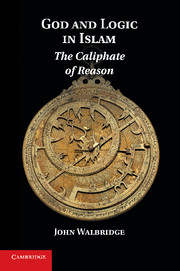Book contents
- Frontmatter
- Contents
- Illustrations
- Preface and Acknowledgements
- Spelling, Names, and Sources
- Introduction
- PART ONE THE FORMATION OF THE ISLAMIC TRADITION OF REASON
- 1 The Problem of Reason in Islam: Is Islam a Non-Rational Religion and Civilization?
- 2 The Diversity of Reason
- 3 Empirical Knowledge of the Mind of God
- 4 The Failure of the Fārābian Synthesis of Religion and Philosophy
- 5 Mysticism, Postclassical Islamic Philosophy, and the Rise and Fall of Islamic Science
- PART TWO LOGIC, EDUCATION, AND DOUBT
- PART THREE THE FALL AND THE FUTURE OF ISLAMIC RATIONALISM
- Selected Bibliography
- Index
5 - Mysticism, Postclassical Islamic Philosophy, and the Rise and Fall of Islamic Science
Published online by Cambridge University Press: 01 March 2011
- Frontmatter
- Contents
- Illustrations
- Preface and Acknowledgements
- Spelling, Names, and Sources
- Introduction
- PART ONE THE FORMATION OF THE ISLAMIC TRADITION OF REASON
- 1 The Problem of Reason in Islam: Is Islam a Non-Rational Religion and Civilization?
- 2 The Diversity of Reason
- 3 Empirical Knowledge of the Mind of God
- 4 The Failure of the Fārābian Synthesis of Religion and Philosophy
- 5 Mysticism, Postclassical Islamic Philosophy, and the Rise and Fall of Islamic Science
- PART TWO LOGIC, EDUCATION, AND DOUBT
- PART THREE THE FALL AND THE FUTURE OF ISLAMIC RATIONALISM
- Selected Bibliography
- Index
Summary
The final third of the twelfth century was a decisive turning point in the history and the historiography of Islamic philosophy. The last great figure of the tradition of Islamic Aristotelianism, Ibn Rushd, was writing his commentaries on Aristotle and died in 1198. He was to have enormous influence, but in Europe, not in the Islamic world. His death marked a break in Western Europe's knowledge of Islamic thought, for he was the last medieval Islamic writer of real significance to be translated into Latin in the Middle Ages. Thus, his death is influential in the Western historiography of Islamic philosophy because, until recently, it was assumed that he was the last philosopher of consequence in the Islamic world, an attitude that even today is not altogether dead. Ibn Rushd's old age coincided with the adulthood and premature death of Shihāb al-Dīn Yaḥyā Suhrawardī (1154–1191), the philosopher-mystic responsible for popularizing Neoplatonism as an alternative to the Aristotelianism of Ibn Sīnā. His masterwork, The Philosophy of Illumination, was completed in 1186. Ibn Rushd's old age also coincided with the youth of the third great intellectual figure of this period, Muḥyi'l-Dīn Ibn ‘Arabī (1165–1240), the greatest of all Muslim mystical theologians. He actually had met Ibn Rushd as a teenager and was beginning serious mystical study at about the time that Suhrawardī was writing The Philosophy of Illumination.
- Type
- Chapter
- Information
- God and Logic in IslamThe Caliphate of Reason, pp. 86 - 104Publisher: Cambridge University PressPrint publication year: 2010

